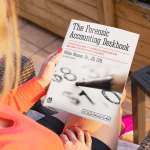Financial Forensic Experts Find Lies That Win Divorce Cases
- At May 16, 2020
- By Miles Mason
- In Divorce Tips, Forensic Accounting
 0
0

The Forensic Accounting Deskbook by Miles Mason, Sr. JD, CPA, published by the ABA Family Law Section
The first step is cross-checking key financial documents like tax returns, financial statements and other disclosures. What “smells wrong?” What is the continuum of lies? How lying can lose a divorce trial.
For a much more detailed discussion, see The Forensic Accounting Deskbook: A Practical Guide to Financial Investigation and Analysis for Family Lawyers, Second Edition, authored by Miles Mason, Sr. and published by the ABA Family Law Section. This updated edition of one the ABA’s most popular resources explains the practice of forensic accounting and business valuation and how to apply it in family law cases. It provides a practice-focused introduction to the core financial concepts in divorce, such as asset identification, classification, and valuation, income determination, expenses, and more.
VIDEO TRANSCRIPT:
Tracy Coenen: What can you tell us about the issue of a forensic accountant being skeptical when looking at financial information?
Miles Mason: Well, as you know, one of the most important aspects, as you mentioned, hidden assets and hidden income issues, but what’s notable about that most of the time it’s right there in plain sight. There’s a difference between a tax return, a financial statement, maybe another type of document, a general ledger where there’s some type of discrepancy that a forensic accountant can look at very quickly and say, “Look at that, that’s not supposed to be there,” or “This doesn’t feel right.” Because forensic accountants are our accountants, and accountants live with these documents every day. Having depressed income right before filing of the divorce and right after, very common. The question is why forensic accountants can do a great job digging that up.
We’re also looking for financial statement manipulation. Who else is going to look at that other than an accountant? And now financial fraud may be rare, but it happens. Because what we see is there’s a continuum of lies. There’s the difference in severity, which when I talk with folks, I mean, how many of us have ended up with a pen from our employer at the house or an eraser? Well, is that technically employee theft? Sure. What about putting a non-business lunch on an expense report? Is that theft? Well, absolutely.
But occasionally has somebody ever taken a buddy out to lunch and run it through the marketing expense of the firm? Probably so. All right. Maybe so. But then there’s lying on a tax return to the federal government, and there’s lying on an interrogatory, and then there’s lying in a deposition. And to me the highest lie that you can have is lying to a judge in a courtroom while under oath with a court reporter going. If you lie then and you get caught, you lose your case.
So it’s very important to be prepared for the person who we know is lying, under reporting their claimed income and as well to go into the courtroom to face a forensic accountant in a skilled cross-examination through an attorney that is experienced and face that crucible. And if they’re willing to lie under oath, or willing to lie on their tax returns, they better be careful because if they get caught, they’re going to lose their case.
Thank you to Tracy Coenen, CPA, CFF for inviting me to join her in this video series. Tracy is a nationally recognized forensic accountant practicing in Milwaukee and Chicago.









